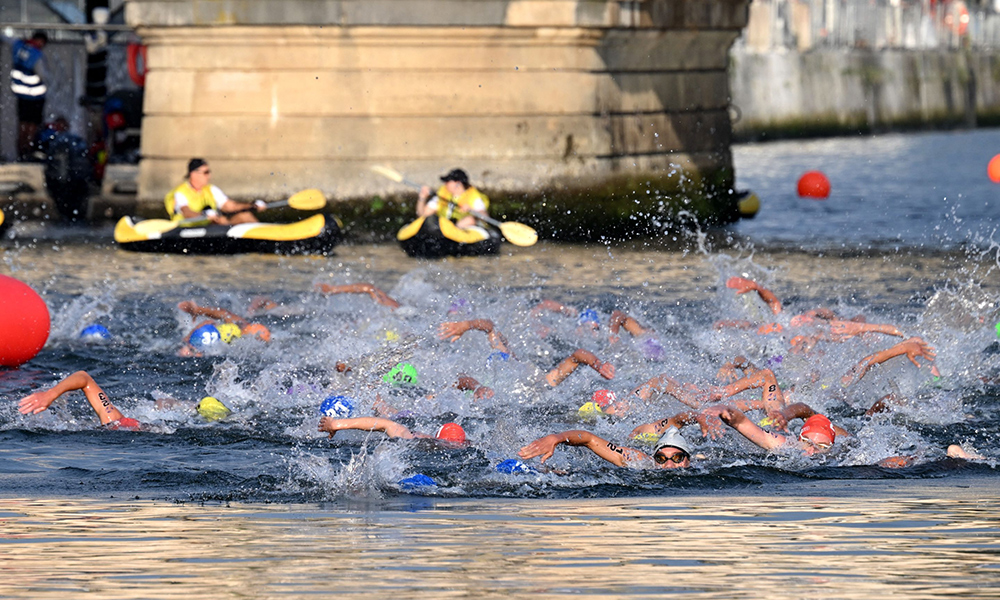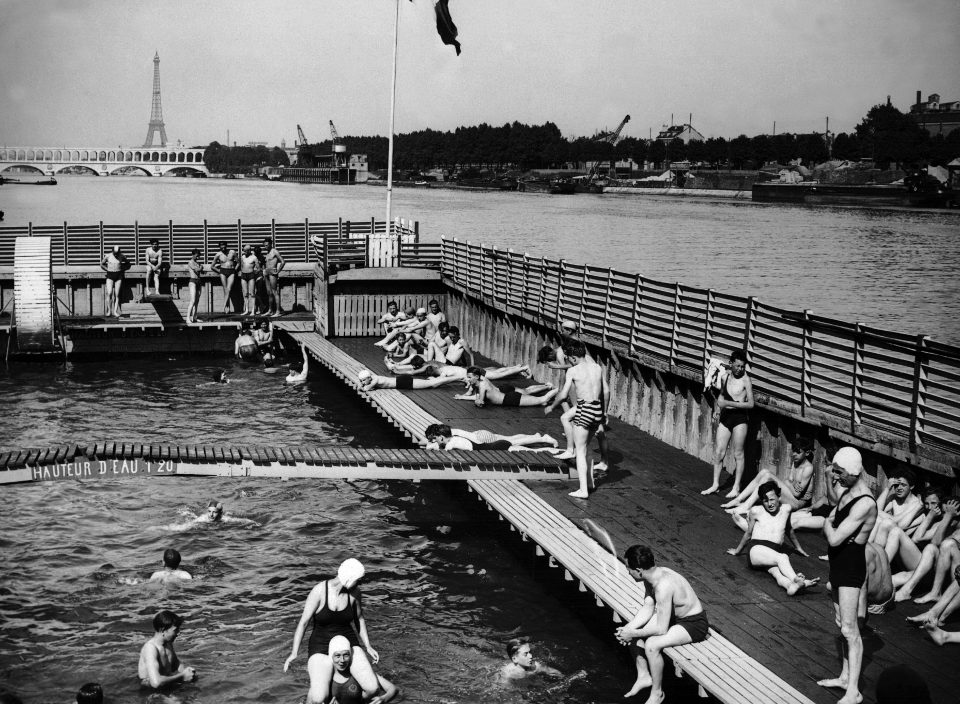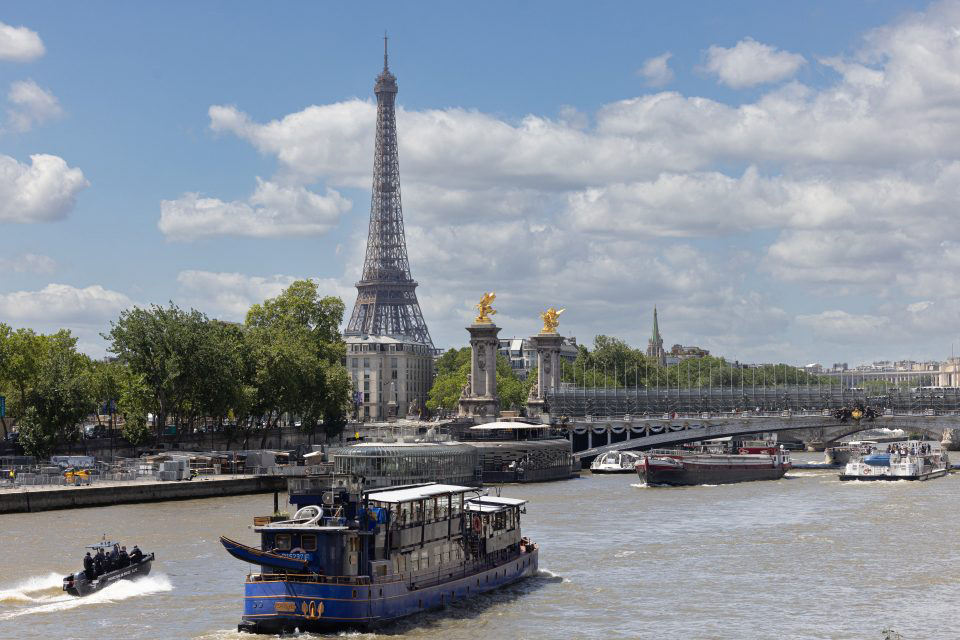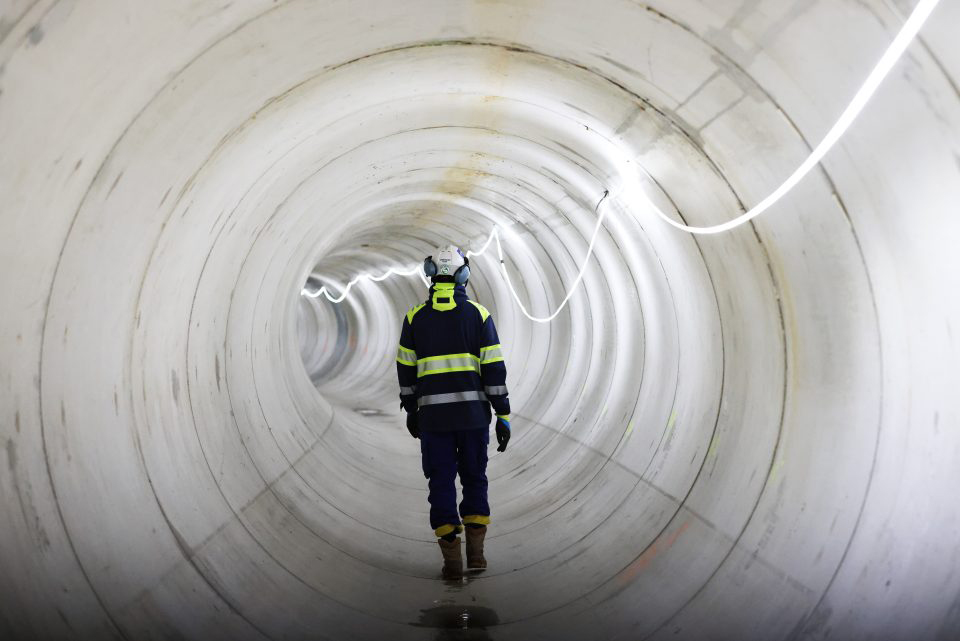
没有塞纳河,巴黎就不再是巴黎了。
塞纳河全长780公里,流经灯火通明的巴黎,从雄伟的埃菲尔铁塔蜿蜒而过。它不仅为游客们提供了游览法国首都的机会,还支撑着河岸上拥有数百年历史、受联合国教科文组织保护的法国书摊。就像泰晤士河之于伦敦一样,它也是巴黎不可或缺的一部分。
尽管塞纳河因其优越的地理位置而被认为是世界上最浪漫的河流,但当人们凝视塞纳河浑浊不堪、有时甚至臭气熏天的河水时,首先想到的却不是这一点。
在过去的几个月里,塞纳河一直在为扮演另一个角色做准备:将于本月晚些时候开幕的2024年巴黎奥运会的中心舞台(备受争议)。
法国当局试图让塞纳河成为这次全球盛会的焦点,原因是这次盛会既是体育人才的平台,也是展示舞台效果和软实力的机会。
巴黎宣布了清理塞纳河的计划,并在100年来首次开放塞纳河供游泳(尽管巴黎人后来也多次下水)。更多的"第一次"接踵而至——奥运会组织者罕见地表示,开幕式将在体育场外的塞纳河上举行,这引发了人们对安全问题的担忧。法国总统埃马纽埃尔·马克龙(Emmanuel Macron)也加入了这一大张旗鼓的宣传活动,他承诺要在塞纳河中游泳,以证明其安全性。

他并不是第一位这样做的总统,1990年,巴黎市长出身的总统雅克·希拉克(Jacques Chirac)也曾表示他将清理河流并下河游泳。
但是,塞纳河的清理工作除了是一个雄心勃勃的噱头外,还反映了当今与此类大规模工作相关的挑战,尤其是如果这项工作具有重要历史意义的话。这是巴黎百年来首次举办奥运会。法国人皮埃尔·德·顾拜旦(Pierre de Coubertin)是在19世纪末重振奥运会的幕后推手,使这项赛事对东道国来说意义更加重大。
塞纳河畔被寄予厚望,但这几个月却很艰难。距离奥运会开幕仅剩几周时间,清理工作已耗资15亿美元,但塞纳河是否可以供游泳仍是个问题。巴黎市长办公室上周四宣布,经过一系列测试失败后,塞纳河的水质已开始出现改善。
市长办公室在一份声明中表示:“这一积极进展是阳光和温暖回归的结果,也是部分改善塞纳河水质战略工作的成果。”然而,鉴于潮湿天气与塞纳河污染水平之间的微妙联系,在奥运会开始之前,情况仍有可能发生变化。
今年6月,塞纳河变成了一个抗议场所,当时活动人士出于同样的原因威胁要在塞纳河里排便,这反映出塞纳河是奥运会至关重要但又敏感的一部分。历史学家、全球体育专家林赛·克拉斯诺夫(Lindsay Krasnoff)告诉《财富》杂志,如果没有奥运会的推动,也许就不会有那么多的动力去清理这样一条标志性的河流。
克拉斯诺夫说:“塞纳河扮演着双重角色,一方面是我们在《艾米丽在巴黎》(Emily in Paris)上看到的明信片时刻,另一方面是作为一条关乎生活、工作、呼吸的河流的现实。”
上个月,在水质监测机构巴黎自来水公司(Eau de Paris)的一项测试中,大肠杆菌含量超过了安全阈值。具有讽刺意味的是,就在这些结果公布前不久,国际奥委会执行主席克里斯托弗·杜比(Christophe Dubi)表示,他“对今年夏天在塞纳河游泳充满信心”,而且“毋庸置疑”,奥运会将按计划进行。
塞纳河既是巴黎奥运会的背景,也是奥运会的主角,其脱颖而出的方式可以为未来的奥运会主办方提供借鉴。

承诺清理塞纳河
巴黎清理塞纳河的努力并不是新鲜事。经过数十年的努力,这里的鱼类数量从20世纪70年代的3种增加到现在的35种。
但是,扭转多年来向塞纳河排放废物的局面绝非易事。巴黎许多家庭的管道系统仍然直接通向河流,而不是污水排放管道,房主将需要自掏腰包来改变这种情况。
亚利桑那州立大学(Arizona State University)专门研究可持续发展和全球水风险的教授杰伊·费米列蒂(Jay Famiglietti)表示,气候变化的影响对塞纳河如何调整其清理工作也起着重要作用。暴雨会使下水道系统不堪重负,导致未经处理的水进入塞纳河。
费米列蒂告诉《财富》杂志:“如今,这些事件发生的频率越来越高。如果说[巴黎奥运会] 的规划有什么疏漏的话,那可能就是没有考虑到这些强暴雨发生的频率正在增加这一事实。”
最近几个月,当局尝试了各种措施来清理塞纳河,包括建造一个蓄水池,以防止水进入塞纳河以及造成水质污染。
尽管巴黎当局多年来一直致力于这项工作,但要预测气候变化的力量及其对清理塞纳河这样的浩大工程的影响,仍是一件棘手的事情。
负责奥运会规划的巴黎副市长皮埃尔·拉巴丹(Pierre Rabadan)今年5月告诉《纽约时报》:“我们能百分之百保证吗?答案是否定的。如果在比赛前连续一周下雨,我们知道,即使已经做了这么多工作,水质可能也不会很好。”
2024年巴黎奥运会组委会的代表没有回复《财富》杂志的置评请求。

展望未来
撇开天气变化不谈,巴黎人并不确定自己是否会在塞纳河中游泳,而当塞纳河水一直没有通过污染检测时,他们就更不确定了。目前还不清楚,如果塞纳河水不符合安全标准,一些奥运比赛项目将如何进行。法国体育部长阿梅莉·乌代亚·卡斯特拉(Amelie Oudea-Castera)今年早些时候说,“没有第二方案”,因为涉及清理河流的某种形式的第一方案必须奏效。
诚然,像塞纳河这样的项目有可能成功,也有可能失败。康奈尔大学(Cornell University)教授詹妮弗·明纳(Jennifer Minner)专门研究了大型活动对主办城市的影响,她指出,大型活动在过去曾推动了城市景观的美化,比如2010年上海世博会前建造的上海后滩公园。
不过,也有令人瞩目的失败案例。臭名昭著案例的是,尽管里约热内卢在2016年奥运会前曾豪言要清理瓜纳巴拉湾,但最终却未能实现这一目标。虽然塞纳河的清理结果尚无定论,但巴黎仍为未来的奥运会树立了榜样。
明纳告诉《财富》杂志:“像奥运会和世博会这样的大型活动可以作为城市转型的催化剂或加速器。它们激发了人们对主办城市和地区如何发展和变革的想象。”她说,通过提升城市生态的作用,巴黎可以为未来的奥运会开创先例。
从巴黎的案例中,我们也可以学到一些关于河流清理工作的经验:在最后期限之前的几年里,要想完成这项工作,需要的远不止是仓促行动。
费米列蒂表示:“我们一次又一次地看到,河流是可以恢复的……只是需要长期承诺。这不可能是政治立场转变,因为这永远不会发生。”
巴黎仍计划明年向公众开放塞纳河。不过,由于政府可能换届,体育赛事周期将于八月结束,目前尚不清楚清理塞纳河是否会成为法国领导人的首要任务。
塞纳河项目让人们看到,除了浮华和魅力之外,作为一个大型活动的主办城市还意味着什么。通过减少新建场馆和循环利用各种体育赛事用水,巴黎奥运会将成为最具可持续性的奥运会。洛杉矶计划在2028年接过主办权后加倍努力,以实现可持续发展。
克拉斯诺夫说:“鉴于环境和可持续发展问题,我们还希望助力重新设定举办奥运会和残奥会的意义和条件......这只是冰山一角。”(财富中文网)
译者:中慧言-王芳
没有塞纳河,巴黎就不再是巴黎了。
塞纳河全长780公里,流经灯火通明的巴黎,从雄伟的埃菲尔铁塔蜿蜒而过。它不仅为游客们提供了游览法国首都的机会,还支撑着河岸上拥有数百年历史、受联合国教科文组织保护的法国书摊。就像泰晤士河之于伦敦一样,它也是巴黎不可或缺的一部分。
尽管塞纳河因其优越的地理位置而被认为是世界上最浪漫的河流,但当人们凝视塞纳河浑浊不堪、有时甚至臭气熏天的河水时,首先想到的却不是这一点。
在过去的几个月里,塞纳河一直在为扮演另一个角色做准备:将于本月晚些时候开幕的2024年巴黎奥运会的中心舞台(备受争议)。
法国当局试图让塞纳河成为这次全球盛会的焦点,原因是这次盛会既是体育人才的平台,也是展示舞台效果和软实力的机会。
巴黎宣布了清理塞纳河的计划,并在100年来首次开放塞纳河供游泳(尽管巴黎人后来也多次下水)。更多的"第一次"接踵而至——奥运会组织者罕见地表示,开幕式将在体育场外的塞纳河上举行,这引发了人们对安全问题的担忧。法国总统埃马纽埃尔·马克龙(Emmanuel Macron)也加入了这一大张旗鼓的宣传活动,他承诺要在塞纳河中游泳,以证明其安全性。
他并不是第一位这样做的总统,1990年,巴黎市长出身的总统雅克·希拉克(Jacques Chirac)也曾表示他将清理河流并下河游泳。
但是,塞纳河的清理工作除了是一个雄心勃勃的噱头外,还反映了当今与此类大规模工作相关的挑战,尤其是如果这项工作具有重要历史意义的话。这是巴黎百年来首次举办奥运会。法国人皮埃尔·德·顾拜旦(Pierre de Coubertin)是在19世纪末重振奥运会的幕后推手,使这项赛事对东道国来说意义更加重大。
塞纳河畔被寄予厚望,但这几个月却很艰难。距离奥运会开幕仅剩几周时间,清理工作已耗资15亿美元,但塞纳河是否可以供游泳仍是个问题。巴黎市长办公室上周四宣布,经过一系列测试失败后,塞纳河的水质已开始出现改善。
市长办公室在一份声明中表示:“这一积极进展是阳光和温暖回归的结果,也是部分改善塞纳河水质战略工作的成果。”然而,鉴于潮湿天气与塞纳河污染水平之间的微妙联系,在奥运会开始之前,情况仍有可能发生变化。
今年6月,塞纳河变成了一个抗议场所,当时活动人士出于同样的原因威胁要在塞纳河里排便,这反映出塞纳河是奥运会至关重要但又敏感的一部分。历史学家、全球体育专家林赛·克拉斯诺夫(Lindsay Krasnoff)告诉《财富》杂志,如果没有奥运会的推动,也许就不会有那么多的动力去清理这样一条标志性的河流。
克拉斯诺夫说:“塞纳河扮演着双重角色,一方面是我们在《艾米丽在巴黎》(Emily in Paris)上看到的明信片时刻,另一方面是作为一条关乎生活、工作、呼吸的河流的现实。”
上个月,在水质监测机构巴黎自来水公司(Eau de Paris)的一项测试中,大肠杆菌含量超过了安全阈值。具有讽刺意味的是,就在这些结果公布前不久,国际奥委会执行主席克里斯托弗·杜比(Christophe Dubi)表示,他“对今年夏天在塞纳河游泳充满信心”,而且“毋庸置疑”,奥运会将按计划进行。
塞纳河既是巴黎奥运会的背景,也是奥运会的主角,其脱颖而出的方式可以为未来的奥运会主办方提供借鉴。
承诺清理塞纳河
巴黎清理塞纳河的努力并不是新鲜事。经过数十年的努力,这里的鱼类数量从20世纪70年代的3种增加到现在的35种。
但是,扭转多年来向塞纳河排放废物的局面绝非易事。巴黎许多家庭的管道系统仍然直接通向河流,而不是污水排放管道,房主将需要自掏腰包来改变这种情况。
亚利桑那州立大学(Arizona State University)专门研究可持续发展和全球水风险的教授杰伊·费米列蒂(Jay Famiglietti)表示,气候变化的影响对塞纳河如何调整其清理工作也起着重要作用。暴雨会使下水道系统不堪重负,导致未经处理的水进入塞纳河。
费米列蒂告诉《财富》杂志:“如今,这些事件发生的频率越来越高。如果说[巴黎奥运会] 的规划有什么疏漏的话,那可能就是没有考虑到这些强暴雨发生的频率正在增加这一事实。”
最近几个月,当局尝试了各种措施来清理塞纳河,包括建造一个蓄水池,以防止水进入塞纳河以及造成水质污染。
尽管巴黎当局多年来一直致力于这项工作,但要预测气候变化的力量及其对清理塞纳河这样的浩大工程的影响,仍是一件棘手的事情。
负责奥运会规划的巴黎副市长皮埃尔·拉巴丹(Pierre Rabadan)今年5月告诉《纽约时报》:“我们能百分之百保证吗?答案是否定的。如果在比赛前连续一周下雨,我们知道,即使已经做了这么多工作,水质可能也不会很好。”
2024年巴黎奥运会组委会的代表没有回复《财富》杂志的置评请求。
展望未来
撇开天气变化不谈,巴黎人并不确定自己是否会在塞纳河中游泳,而当塞纳河水一直没有通过污染检测时,他们就更不确定了。目前还不清楚,如果塞纳河水不符合安全标准,一些奥运比赛项目将如何进行。法国体育部长阿梅莉·乌代亚·卡斯特拉(Amelie Oudea-Castera)今年早些时候说,“没有第二方案”,因为涉及清理河流的某种形式的第一方案必须奏效。
诚然,像塞纳河这样的项目有可能成功,也有可能失败。康奈尔大学(Cornell University)教授詹妮弗·明纳(Jennifer Minner)专门研究了大型活动对主办城市的影响,她指出,大型活动在过去曾推动了城市景观的美化,比如2010年上海世博会前建造的上海后滩公园。
不过,也有令人瞩目的失败案例。臭名昭著案例的是,尽管里约热内卢在2016年奥运会前曾豪言要清理瓜纳巴拉湾,但最终却未能实现这一目标。虽然塞纳河的清理结果尚无定论,但巴黎仍为未来的奥运会树立了榜样。
明纳告诉《财富》杂志:“像奥运会和世博会这样的大型活动可以作为城市转型的催化剂或加速器。它们激发了人们对主办城市和地区如何发展和变革的想象。”她说,通过提升城市生态的作用,巴黎可以为未来的奥运会开创先例。
从巴黎的案例中,我们也可以学到一些关于河流清理工作的经验:在最后期限之前的几年里,要想完成这项工作,需要的远不止是仓促行动。
费米列蒂表示:“我们一次又一次地看到,河流是可以恢复的……只是需要长期承诺。这不可能是政治立场转变,因为这永远不会发生。”
巴黎仍计划明年向公众开放塞纳河。不过,由于政府可能换届,体育赛事周期将于八月结束,目前尚不清楚清理塞纳河是否会成为法国领导人的首要任务。
塞纳河项目让人们看到,除了浮华和魅力之外,作为一个大型活动的主办城市还意味着什么。通过减少新建场馆和循环利用各种体育赛事用水,巴黎奥运会将成为最具可持续性的奥运会。洛杉矶计划在2028年接过主办权后加倍努力,以实现可持续发展。
克拉斯诺夫说:“鉴于环境和可持续发展问题,我们还希望助力重新设定举办奥运会和残奥会的意义和条件......这只是冰山一角。”(财富中文网)
译者:中慧言-王芳
Paris isn’t Paris without the River Seine.
The 780-kilometer-long river, which runs through the city of light and curves around the mighty Eiffel Tower, not only hosts tourists taking in the sights of the French capital but also supports centuries-old UNESCO-protected French bookstalls on its banks. It is an indispensable part of the Parisian experience, just like the Thames River is to London.
Despite being considered the most romantic river in the world by virtue of its location, that’s not the first thought crossing people’s minds as they peer into Seine’s murky, sometimes stinky waters.
In the past few months, the Seine has been gearing up to take on another role: a controversial center stage for the 2024 Paris Olympics, which will kick off later this month.
French authorities sought to put Seine in the spotlight at the global event, which is as much an opportunity for theatrics and soft power as it is a platform for sporting talent.
Paris announced plans to clean up the river and open it up for swimming for the first time in 100 years (even though Parisians dipped into it a few times after). More “firsts” followed—in an uncommon move, the Olympics organizers said the Games’ opening ceremony would be held outside the stadium and on the Seine instead, sparking security concerns. President Emmanuel Macron joined the fanfare by vowing to swim in the river to prove its safety.
He isn’t the first president to do so—in 1990, Paris mayor-turned-President Jacques Chirac also said he’d clean up the river and take a dip in it.
But apart from being an ambitious stunt, the Seine’s clean-up reflects the present-day challenges associated with such mammoth-sized efforts, particularly if the undertaking has historical importance. Paris is hosting the Olympics for the first time in 100 years. A Frenchman, Pierre de Coubertin, was behind reviving the Games in the late 19th century, making the event even more significant for its hosts.
Amid all the hopes vested in the Seine, it’s had a rough couple of months. With just weeks to go before the Games start and $1.5 billion already spent on clean-up efforts, the river’s readiness for swimming still remains in question. After a series of failed tests, the Seine’s water quality has begun improving, the Paris mayor’s office announced on Thursday.
“This positive development is a consequence of the return of sunshine and warmth as well as the effects of the work done as part of the strategy to improve the quality of the Seine’s waters,” the office said in a statement. However, given the delicate link between wet weather and the Seine’s contamination levels, things can still change before the Games commence.
The Seine turned into a protest site in June when activists threatened to defecate the river for the same reason, reflecting how the river is a crucial but sensitive part of the Olympics. But without the push of the Olympics, perhaps there wouldn’t have been much of an incentive to make headway with cleaning such an iconic river, Lindsay Krasnoff, a historian and global sports expert, told Fortune.
“The Seine plays this dualistic role between our Emily in Paris postcard moments and the reality of being a living, working, breathing river,” Krasnoff said.
Last month, E. coli levels exceeded the safe threshold in a test by water monitoring group Eau de Paris. Ironically, those results were announced just after the International Olympic Committee’s executive, Christophe Dubi, said he was “confident that we will swim in the Seine this summer” and had “no reasons to doubt” that the Olympics will progress as planned.
The river is both the backdrop and the main character in the Paris Olympics and how it emerges from them could offer lessons for future hosts of the Games.
Undertaking to clean the Seine up
Paris’s efforts to clean up the Seine aren’t new. The result of the decades-long attempt can be seen in the thriving fish species it houses, up from three in the 1970s to about 35 now.
But reversing years of waste discharged into the river was never going to be easy. The plumbing system in many Parisian homes still has direct outlets to the river instead of wastewater drainage pipes, and homeowners will need to pay out of their pockets to change that.
The impact of climate change also plays a significant role in how the Seine adjusts to its clean-up efforts, said Jay Famiglietti, a professor at Arizona State University specializing in sustainability and global water risk. Heavy rainfall can overwhelm the sewer system, resulting in untreated water entering the Seine.
“Today, these events are occurring with more frequency,” Famiglietti told Fortune. “If there’s one thing that perhaps slipped under the radar in the planning [of the Paris Olympics], it might have been accounting for the fact that the frequency of these intense storms is increasing.”
In recent months, authorities have tried various measures to clean up the Seine, including constructing a storage basin that prevents water from entering the river and degrading its quality.
Even though Parisian authorities have been working on the effort for years, it can be tricky to anticipate the forces of climate change and their impact on such colossal undertakings as cleaning the Seine.
“Do we have a 100 percent guarantee? The answer is no,” Pierre Rabadan, Paris’s deputy mayor overseeing the Olympic plans, told the New York Times in May. “If it rains for a week continually before the races, we know the quality of water — even with all the work that has been done — probably won’t be excellent.”
Representatives at the Paris Olympics 2024 organizing committee didn’t return Fortune‘s request for comment.
A glimpse of the Bassin d’Austerlitz, a huge water tank which aims to clean up the Seine River.
Looking to the future
Weather changes aside, Parisians aren’t sure they’d dip in the Seine—less so when its water keeps failing contamination tests. It’s still unclear what might happen to some of the Olympic events if the river water doesn’t pass the safety standards. France’s Sports Minister Amelie Oudea-Castera said earlier this year that “there is no plan B” because some form of plan A involving cleaning up the river will just have to work.
To be sure, projects like the Seine’s can be a hit or a miss. Large-scale events have prompted the beautification drives of urban landscapes in the past, as in the case of Shanghai Houtan Park created ahead of the Shanghai 2010 World Expo, Jennifer Minner, a Cornell University professor specializing in the impact of mass events on their host cities, pointed out.
But there are also cases of spectacular failures—Rio de Janeiro infamously failed to clean up Guanabara Bay despite lofty promises to do so ahead of the 2016 Olympics. While the jury is still out on the Seine, Paris still sets an example for future Games.
“Mega-events such as the Olympics and World Expos can be used as catalysts or accelerators for all sorts of urban transition. They spur imagination about how host cities and regions can grow and change,” Minner told Fortune. She said that by elevating the role of urban ecology, Paris could set a precedent for future Games.
There’s also something to be learned about river clean-up efforts from Paris’s case: it will take much more than scrambling in the few years before the deadline.
“We’ve seen time and time again that rivers can be restored.. it just takes a long-term commitment. It can’t be a political flip-flop because it will never happen,” Famiglietti said.
Paris still plans to open the Seine to the public next year. However, with a possible change in government and the sports event cycle closing in August, it’s unclear if cleaning the Seine will be a top priority for French leaders.
The Seine project puts into perspective what being a host city for a grand event means, aside from the glitz and glamor. Paris set out to make its iteration of the Olympics the most sustainable version of the Games yet by minimizing new venues and recycling water used for various sporting events. Los Angeles plans to double down on such efforts when the host baton is passed on to them in 2028.
“The desire to also help to reset what it means and what it takes to host the Olympic and Paralympic cycles given the environmental and sustainability issues … that’s just the tip of the iceberg,” Krasnoff said.






